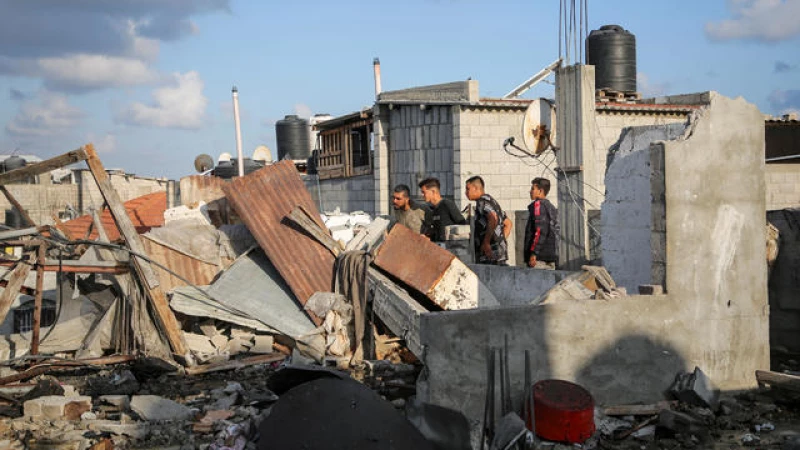Jerusalem — An Israeli tank brigade took control Tuesday of the Gaza Strip side of the Rafah border crossing with Egypt, authorities said, moving forward with an offensive in the southern city even as cease-fire negotiations with Hamas remain on a knife's edge.
The move comes after hours of whiplash in the Israel-Hamas war, with the militant group on Monday saying it accepted an Egyptian-Qatari mediated cease-fire proposal. Israel, meanwhile, insisted the deal didn't meet its core demands. The high-stakes diplomatic moves and military brinkmanship left a glimmer of hope alive - but only barely - for an accord that could bring at least a pause in the 7-month-old war that has devastated the Gaza Strip.
The Israeli 401st Brigade entered the Rafah crossing early Tuesday morning, the Israeli military said, taking "operational control" of the crucial crossing. It's the main route for aid entering the besieged enclave and exit for those able to flee into Egypt. Israel has fully controlled all access in and out of Gaza since the war began.
Israeli Military Seizes Gaza Crossing, Claims Terrorist Use
Recently released footage from the Israeli military showcases a tank making its way into the crossing. The video confirms the identity of the crossing and displays Israeli flags waving proudly from the tanks that took control of the area.
According to the Israeli military, the seizure of the crossing was prompted by intelligence suggesting its involvement in "terrorist activities." While concrete evidence to support this claim was not immediately provided, the military alleged that the vicinity of the crossing had been utilized to launch a mortar attack that resulted in the tragic death of four Israeli soldiers and injuries to others near the Kerem Shalom Crossing.
Furthermore, the military disclosed that both ground forces and airstrikes were directed at suspected Hamas positions in Rafah.
Reports from the Reuters news agency, quoting Palestinian health officials, indicate that at least 20 Palestinians lost their lives and several others sustained injuries from strikes hitting a minimum of four residential buildings.
Wael Abu Omar, a spokesperson for the Palestinian Crossings Authority, confirmed the Israeli takeover of the crossing and its temporary closure. He mentioned that the area had been under attack since Monday.
When approached for a statement regarding the Israeli seizure, a representative from the Egyptian Foreign Ministry opted to withhold immediate comments. Egypt had previously cautioned against any potential seizure of Rafah, fearing an influx of Palestinian refugees across the border, which could jeopardize the 1979 peace agreement with Israel and disrupt regional stability.
Israeli-Palestinian Conflict Continues as Cease-Fire Proposal Raises Concerns
The recent offensive has once again heightened the possibility of a full-scale Israeli attack on Rafah, a move that is strongly opposed by the United States and feared to have devastating consequences for the 1.4 million Palestinians seeking shelter in the area.
According to Egyptian officials, the proposed cease-fire involves multiple stages, including a limited release of hostages and partial withdrawal of Israeli troops from Gaza. The ultimate goal is to negotiate a lasting peace that would result in a complete release of hostages and a significant Israeli retreat from the territory.
An Israeli official, speaking anonymously to Reuters, expressed skepticism about the Hamas-endorsed proposal, suggesting that it falls short of previous offers from Egypt and may be a tactic to portray Israel as the party unwilling to make a deal.
Hamas, on the other hand, is pushing for clearer assurances regarding its demand for an end to the conflict and a full Israeli withdrawal in exchange for the release of all hostages. However, Israeli leaders have adamantly refused this demand, vowing to continue their military campaign until Hamas is eradicated following the October 7 attack.







